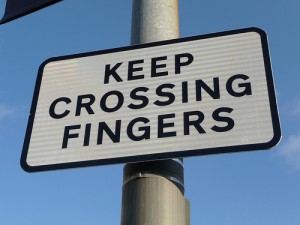Planned Happenstance: Is Career Luck Really Random?

Do you feel like luck never seems to go your way? Do you have that friend that you are secretly jealous of because they seem to fall into that dream job, or they seem to always find a way to be around when opportunities arise?
If you answered yes, then this post is for you.
Many people have the perception that the job search and developing your career are tracks you have to follow. You go to school, get an internship, and then you graduate and eventually find a job.
This is true at a certain level, however there are additional aspects to the successful development of your career.
Why is it that some people seem to have all the luck, while others don’t?
Some people believe that luck is actually an intersection of understanding yourself and what you want, added with a little preparation and calculated risk taking.
When you do the work of understanding yourself and understanding where you want to go, it can help you to focus on opportunities that may be of interest to you. Basically, the more you are aware of something, the more you will notice it.
For instance, when you are sad, you notice how many sad songs you hear on the radio. Ask yourself if there are more sad songs being played because of how you feel, or if you just notice them more because of how you feel?
Four key ways to improve your chances at creating opportunities
I’ll explain this using the basic tenets of planned happenstance, a career development theory by Kathleen Mitchell. For the sake of clarity, as a case study I will use myself and how I came to blog at StudentBranding.com.
1. Pay attention to your natural curiosity and interests
What are things that you just naturally enjoy doing? What hobbies do you have?
I have always enjoyed reading and writing. In fact, in college I served on an editorial board for a poetry magazine. I performed the best in most classes largely because I enjoyed putting my thoughts together on paper. I enjoy reading what others have to say about the topics of career development, and it excites me to find new ways to assist students.
2. Eliminate Barriers
Instead of thinking about what might happen if you fail, think about what might happen if you succeed.
About three years ago, I started reading about blogging and social media. It intrigued me mainly because I had longed for an outlet where I could write. So, I read a few articles and decided to create a WordPress account and see what I could do with it. Within a week I was hooked on the idea and had started my own blog. Of course, there were, and still are, many things I am learning about . However, instead of negatively worrying about what might happen, I continued to move forward and just enjoy what I was doing.
3. Plan for the unplanned
Once you have a sense of your interests and have eliminated barriers, you may start to notice more opportunities. Also, opportunities may just appear out of nowhere – so be ready to act once they do. Opportunities may appear as chance encounters, new experiences, or even random communication.
After writing for my own personal blog for about a year, I felt more comfortable and confident in my writing. I had a small taste of success in terms of other career advisors who were on Twitter who had reached out to me and told me that they liked what I had to say.
In December, I received an email from Dan Schawbel asking me to consider writing for StudentBranding.com. I was shocked and surprised that he knew who I was and had seen my writing. After considering the pros and cons, I decided to take action and jump on the opportunity to write for the blog.
4. Take Action
Taking action can mean a variety of things. It could be leaping at an opportunity for a new job, or taking the chance to meet someone you admire in your field. You may learn about a new skill that you would like to develop and take action to develop that skill.
Once I took the opportunity to write for the blog, I tried to learn more by reading and following other authors that I respected and enjoyed reading. Additionally, I took the time to read articles on topics outside of the realm of career development to get a sense of what writing styles I liked best. I constantly strive to improve my writing. Finally, when someone reads my posts and comments or reaches out, I always try to follow up with them.
Think back to how you got to where you are today. How did you get there?
You never know where chance encounters will take you, but you can help your “luck” by planning for the day when it comes.
[This post was originally written for the Student Branding Blog.]